Academic Excellence

CMLL Welcomes New Faculty
Dr. Belinda Kleinhans, Assistant Professor of German
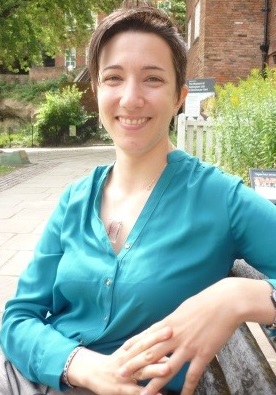
Belinda Kleinhans comes to Texas Tech from the University of Manitoba Canada where she taught German language and culture, film and gender studies. In her teaching and research, she is usually working at the intersection of philosophy, literature and other cultural artefacts within a post humanist and poststructuralist framework.
Originally from Germany, she has been living in North America in Canada since 2006. She came to the University of Waterloo in Ontario (Canada) to complete a Masters in German, and she has continued on and finished her Ph.D. in 2013. Her dissertation, positioned in the area of Cultural and Literary Animal Studies, analyses the representation of animals in German literature after 1945, seeking a deeper understanding of the connection between language, representation and power. It analyzes how postwar German writers negotiate anthropocentric and speciesist discourses via animal figures. Because these writers disorient one's perception of reality via figures of the animal, i.e. animals as both metaphors and as subjects, she develops what she would like to call an "animal poetology" unique to them. At the core of this animal poetology lies the question how animals in literary texts are constructed, how the authors negotiate the ontological and epistemological status of animals, and how language can stop or even disable the anthropological machine which produces the gap between humans and animals.
Her current research can best be described in the category of critical theory and cultural studies. The connection of power relationships within a speciesist framework is a key interest of hers. The twentieth century has seen an unprecedented degree of objectification and utilization of the animal; Derrida has even called it an "animal genocide". The following ethical questions lie at the core of this "genocide" and the treatment of animals: Who deserves the right to live, who is the "other" whom I have to respect as a living being? Literature and art exemplarily unsettle the unquestioned ethical dimensions of animal utilization and explore not only how language supports power structures, but also how language can subvert and challenge them. The field of literary animal studies can thus draw out alternative conceptions of species relations which unsettle the humanistic faith in knowledge of animal life as ends in themselves. By tracing moments of the open in other, also contemporary authors, I aim at developing a way at inclusively looking at all others and developing an ethical understanding of the other which is not exclusive to any creature.
In her free time, she likes to go for long walks or hikes, or travel to explore foreign cultures. Not surprisingly for a literature professor, she likes to read, and is fond of contemporary poetry and short stories.
Dr. Starra Priestaf, Assistant Professor of French

Starra Priestaf completed her PhD in French at Emory University where she specialized in seventeenth-century French literature and culture. Her research and teaching interests include early modern French studies, literary theory, medical humanities, and psychoanalysis.
Her dissertation, "Ruptures in Address: The Letter as Technical Device in the Works of Guilleragues, Sévigné, and Lafayette," examines the letter in order to explore both its effectiveness and failure as a communicative and transactional device. Focusing on Guilleragues's Lettres portugaises (1669), Madame de Sévigné's Correspondance (1725), and Madame de Lafayette's La Princesse de Clèves (1678), the letter discloses a fundamental anxiety concerning the difficulty of transmitting and securing meaning, and validating its mission as a medium for exchange. She argues that the stability and reliability of the framework that the letter embodies as a means of communication and exchange will be consistently tested and challenged, reflecting in turn the inability to secure representation during the Classical period.
A forthcoming project entitled, "The Monstrous Feminine: Discourse and Dissimulation in Early Modern French Fiction," examines the feminine practice of dissimulation as a calculated performance which threatens to devastate sovereign authority and rule in sixteenth and seventeenth century French theatre and literature (Marguerite de Navarre, Madame de Lafayette, Corneille, and Racine). She is interested in female characters who refuse to subscribe to hetero-normative modes of conduct which privilege virtue, silence, and obedience.
In conjunction with her research, she is designing a course, "Deciphering Bodies: Disability, Disease, and Monstrosity in Early Modern France," which explores early modern constructions of disability and disease as belonging to the category of monstrous. This course examines the works of François Rabelais, Michel de Montaigne, and Ambroise Paré as they attempt to naturalize difference or at least to dispel the anxiety and fear that traditionally accompany the appearance of disabled or diseased bodies.
Dr. Neil Anderson, Visiting Professor of Spanish
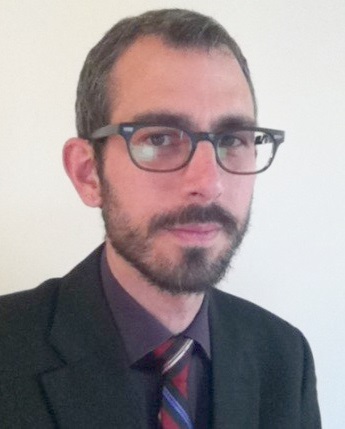
Neil Anderson, Visiting Assistant Professor of Spanish for 2014-15, is a native of Ann Arbor, Michigan. Anderson received his BA in Spanish from the University of Maine, Orono, his MA in Spanish from Middlebury College, and his Ph.D. in Romance Languages from the University of North Carolina, Chapel Hill. During his studies at the University of Maine, Anderson spent a year at the Universidade de Santiago de Compostela in Galicia, Spain, where he became interested in Galician language and culture. His dissertation, "Microgeographies: Galician Narratives of Place (2004-2012), explored the ways in which recent Galician-language narrative fiction represents individual and collective experiences of place.
His current critical project focuses on how Galician culture is reimagining its relationship to rural spaces. In this vein, he is preparing a book chapter on the poetics of emplacement in María Reimóndez's En vías de extinción, and an article on post-rural "phantasmophilia" in Xurxo Borrazás's Ser ou non.
In addition to his academic work, he is a translator of Galician-language poetry and short fiction, with translations of works by Berta Dávila, María do Cebreiro, and Xurxo Borrazás published or forthcoming.
Dr. Peter Miller, Visiting Professor of Classics
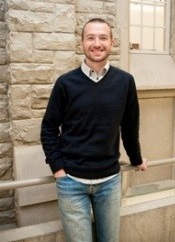
Peter Miller is beginning his first year as a Visiting Assistant Professor of Classics in CMLL. Dr. Miller is British by birth, but grew up in the metropolitan Toronto area in Canada. Before coming to TTU, he taught at Mount Allison University, a small college in Eastern Canada, and at the University of Western Ontario (London, Canada), where he also completed his PhD in Classics in 2014. Dr. Miller specializes in the literature and culture of Archaic and Classical Greece, and his research particularly focuses on ancient athletics, lyric poetry, and questions of gendered, socio-economic, and ethnic identity. He is keen to demonstrate the interconnection of the ancient and modern worlds, and has published on issues of gender identity in antiquity, and is especially interested in the indebtedness of modern athletics to their ancient predecessors.
Dr. Miller enjoys talking to his students and others about the ancient world, and when not in his office, can be found running around Lubbock; he is an avid long-distance runner and has completed several marathons, although, he is quick to note, the marathon was not, in actuality, an ancient sport!Degrees Awarded - August 2014
Maria Arciniega: PhD Spanish & Portuguese
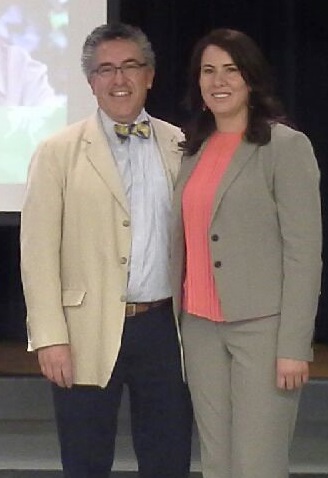
Dissertation title: "DÓCIL REBELDÍA: LAS MUJERES EXILIADAS DE SILVIA MOLINA"
Defense Committee:
Chair: Dr. Jorge Zamora
Members: Drs. Genaro Perez & George Cole
Graduate School Representative: Dr. Wendell Aycock
Sabrina Laroussi: PhD Spanish & Portuguese
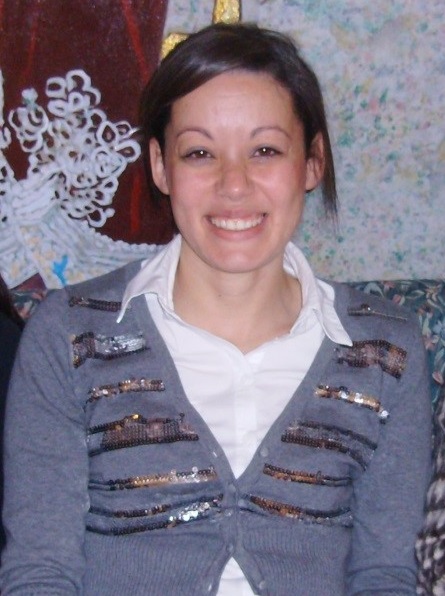
Dissertation title: "Sicarios, putas y religión: lo grotesco en la narconovela colombiana"
Defense Committee:
Chair: Dr. George Cole
Members: Drs. Julián Pérez & Jorge Zamora
Master of Arts Romance Languages
SPANISH
Micah Burns
Bachelor of Arts
FRENCH
Shelby Thibodeaux
Ellen Janice O'Connor
SPANISH
Arroniz, Adrian S.
Teneisha Howard
Sidney M. Richburg
Dr. Diego Pascual y Cabo Selected As 2014-2015 Service-Learning Faculty Fellow
The Teaching, Learning, and Professional Development Center at Texas Tech University selected Dr. Diego Pascual y Cabo as a 2014-2015 Service-Learning Faculty Fellow. As a result of his participation in this fellows program, Dr. Pascual will include a service Learning component into the newly designed SPAN 3315 (Intermediate Conversation for Bilingual Students) which will combine both in-classroom instruction with service learning involvement. This will in turn create more opportunities to our heritage language learners to (i) continue to increase their overall communicative proficiency in Spanish, (ii) use Spanish in accurate, effective, and informed ways within a variety of social and cultural contexts, (iii) gain a better understanding of the inherent diversity and complexity of Hispanic culture(s) in the United States, and (iv) renew contact with their cultural and linguistic heritage.
Dr. Carole Edward's Article One of the Editor's Top Ten Most Downloaded
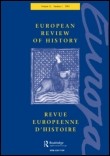
Dr. Carole Edwards' article, "Réalité ou fiction? L'histoire à l'épreuve du postmodernisme" published in the European Review of History Routledge-Revue europeenne d'histoire , Volume 18, Issue 4, 2011, was one of the top ten most downloaded articles in the first half of 2014 of editors.
Kristi Thrasher named "Outstanding Faculty by Student Disability Services" in January 2014
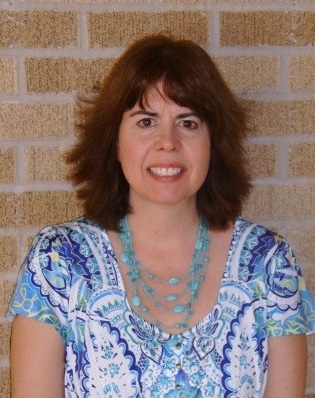
Edith Lozano-Pozos Receives Two Scholarships
Edith was the recipient of the Summer Dissertation Scholarship and of the American Mexican Friendship-Waterman Scholarship. These scholarships will facilitate her ability to complete her dissertation while pursuing her academic and career goals: to help Latinos/as maintain their culture and language by spreading knowledge and understanding of the rich Latin-American culture to the community at large through teaching, research , and community involvement. "I look forward to the day I can help other students achieve their dreams, just as you helped me. " Edith Lozano-Pozos
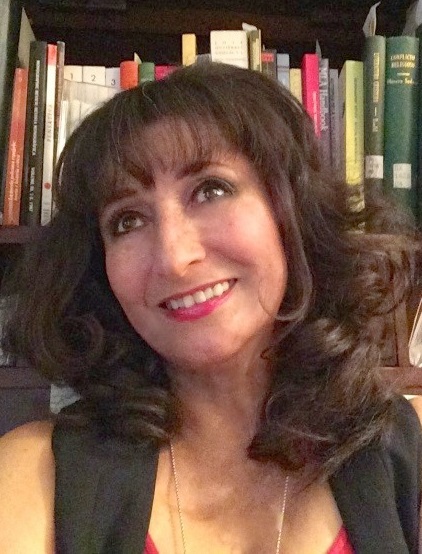
Ms. Lozano-Pozos presented a paper entitled, "Noir narrative: manifestation of vox populi in Hispanoamérica" at the 47th SCOLAS Conference 2014 in San Diego, California from March 27-29.
She presented a paper entitled, "Another Noir narrative: The Jesuit network into the Cristero's War process "at the 2014 Latin American Studies Association in Chicago, Illinois from May 27-29. The congress theme was Democracy and Memory.
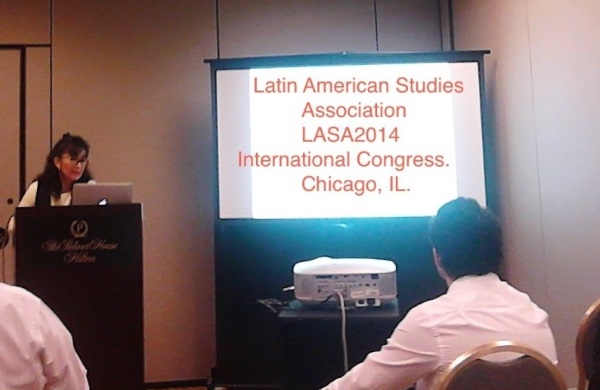
Varona Lectures at the XXVII Semana Negra de Gijon
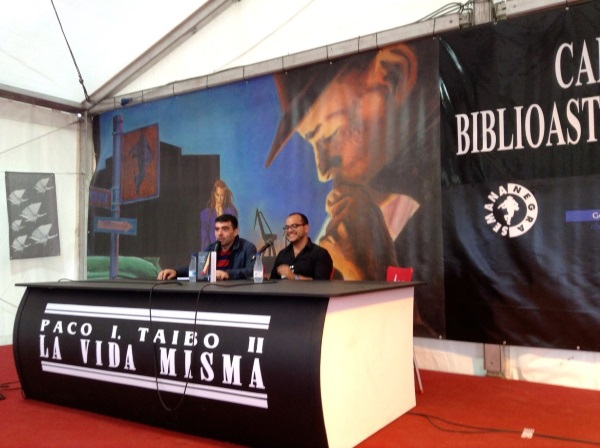
Rubén Varona, PhD Spanish candidate, participated as a special guest in the XXVII Semana Negra de Gijon July 4-13 in Spain. In the framework of this prestigious literary event devoted to the crime fiction genre, Varona presented his most recent novel titled, El sastre de las sombras, La Pereza Ediciones (2013). During the conference, he and several well-known Latin American authors were the panelists for "Latinoamérica se escribe en negro", with several well-known authors from Latin America whom drew a panorama of the genre in Hispanic countries through their experiences as writers and scholars.
Castellanos Receives Fulbright Scholarship
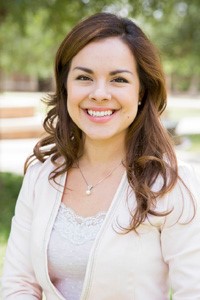
Flor Castellanos, who graduated in December 2013 with a bachelor's degree in German and serves as an international alumni specialist in the Office of International Affairs, was accepted to Thailand to teach English to middle school or high school- aged children for the academic year 2014-2015. Castellanos is one of about 1,800 U.S. citizens who were selected to travel abroad through Fulbright U.S. Student Program. The program offers fellowships for U. S. graduating college seniors, graduate students, young professionals and artists to study abroad in more than 155 countries worldwide. Recipients of Fulbright grants are selected on the basis of academic or professional achievement as well as demonstrated leadership potential in their fields.
Classical & Modern Languages & Literatures
-
Address
CMLL Building, 2906 18th St, Lubbock, TX 79409 -
Phone
806.742.3145
